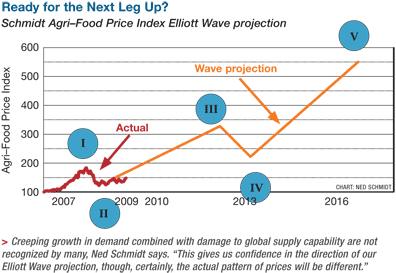Moneywise

Batten the Hatches
Serious problems that developed in the agricultural credit situation in 2009 could escalate in 2010–2011, says Danny Klinefelter of Texas AgriLife. "The past two years in commodity, real estate and financial markets have made it abundantly clear that changes can occur quickly. We have also learned that 'Black Swan' events are real."
The earliest problems arose in the livestock sector, he notes. "Producers in all protein sectors have suffered significant losses for over a year, resulting in a large increase in nonperforming loans. Although there were few foreclosures in 2009, without a significant turnaround in income, many dairy and hog loans are in a near-crisis situation. Many producers have lost enough equity that lenders will be forced to discontinue financing."
The total agricultural impact will be magnified because many dairy and hog enterprises represent the majority of their total operation's assets. If the livestock operation fails, all assets will have to be liquidated, including land, he adds.
"Some well-managed hog operations will be liquidated not just because of their own performance, but because their integrator fails and the entire supply chain goes down with them," Klinefelter says.
"Crop producers have fared fairly well over the past several years, but many are likely to have carryover operating debt if they purchased inputs early in the year when inputs were high and then had a poor crop or forward priced their crop after prices declined," he says.
"Fortunately, most grain producers have had a run of several years of above-normal income and pushed cash forward into 2009 for tax reasons. Now, margins appear to be returning to normal."
Shakeout. "The reality is that there has been little involuntary exit in the past four or five years. Unfortunately, boom periods tend to be followed by a cleansing period of about three years and a hangover effect can extend beyond that," Klinefelter says. Going forward, "business success depends on continuous improvement at a pace necessary to stay out of the back of the pack." –Linda H. Smith
![]() Management Skills Count Again
Management Skills Count Again
You didn't have to have the best management skills in 2008 to make a reasonable income. Now, "manage-ment skills are going to make the difference," says Michael Boehlje, Purdue University ag economist.
"If you look at the full cost to produce an acre of corn for average yield and productivity, we're back in the same kind of negative margin we had in 2003–2005," he says. "For a 1,000-acre corn/soybean farmer, that's minus $80/acre; for a 3,000-acre farm, it's minus $50.
For 2010 cost and return estimates from several universities. –Charles Johnson
Entering Second-stage Upswing?
Elliott Wave theory originated in the 1930s. Based on market psychology and momentum, it projects market moves, usually three up and then two down. As the chart shows, we could be in the beginning stages of a longer upward trend for an agriculture–food index followed by Ned Schmidt, a financial adviser with Schmidt Management Company. He cites population growth: "Unless the population of the world shrinks, agri–food demand will continue to rise." 
![]() Paperwork Blizzard Ahead?
Paperwork Blizzard Ahead?
A court case decided earlier this year could mean you must apply for an NPDES (National Pollutant Discharge Elimination System) permit from which you may traditionally have been exempt. The decision by the U.S. 6th Circuit Court in National Cotton Council of America v. EPA said EPA was incorrectly enforcing the federal Clean Water Act, which requires permitting for applications into, over or near water.
The American Farm Bureau Federation (AFBF) has filed a petition with the U.S. Supreme Court to review the ruling. "This court opinion dramatically changes the scope of the Clean Water Act and will force farmers, public health agencies and many others into burdensome, time-consuming and costly permitting requirements that could seriously impair their ability to use pesticides to protect croplands and public health [e.g., mosquito control]," says Julie Anna Potts, AFBF's general counsel.
This is a complex case, with definitions of "chemical waste, pollutants, discharge, point sources, navigable waters and near water" all potentially playing a role, says Craig Raysor, an attorney with Gillon & Associates in Memphis, Tenn. "By overruling EPA's aquatic pesticide application, which assumed that if you comply with FIFRA [the Federal Insecticide, Fungicide and Rodenticide Act], you were not subject to the Clean Water Act permitting process, this court adopted a rationale that could erode other statutory exemptions [such as stormwater runoff] that have long governed and protected farmers and pesticide applicators," he says.
"EPA has to start at the beginning for many of these applications, which is why it requested and received a two-year stay on enforcement of the decision," he adds. "Perhaps most worrisome is that this will open farmers and applicators to private suits in an area where they were not exposed to liability before." –Linda H. Smith
Top Producer, December 2009







